
Philip Kindred Dick, often referred to by his initials PKD, was an American science fiction writer. He wrote 44 novels and about 121 short stories, most of which appeared in science fiction magazines during his lifetime. His fiction explored varied philosophical and social questions such as the nature of reality, perception, human nature, and identity, and commonly featured characters struggling against elements such as alternate realities, illusory environments, monopolistic corporations, drug abuse, authoritarian governments, and altered states of consciousness. He is considered one of the most important figures in 20th century science fiction.
"Second Variety" is a science fiction novelette by American writer Philip K. Dick, first published in Space Science Fiction magazine, in May 1953. Set in a world where war between the Soviet Union and United Nations has reduced most of the world to a barren wasteland, the story concerns the discovery, by the few remaining soldiers left, that self-replicating robots originally built to assassinate Soviet agents have gained sentience and are now plotting against both sides. It is one of many stories by Dick examining the implications of nuclear war, particularly after it has destroyed much or all of the planet.
"The Variable Man" is a science fiction novella by American writer Philip K. Dick, which he wrote and sold before he had an agent. It was first published in the British magazine Space Science Fiction Vol. 2 No. 2, July 1953, and in the American version on September 1953, with the US publication illustrated by Alex Ebel. Despite the magazine cover dates it is unclear whether the first publication was in the UK or in the United States where magazines tended to be published farther ahead of their cover dates than in the UK. The Variable Man can be found in several collections of Dick's short stories, including The Variable Man and The Short Happy Life of the Brown Oxford.
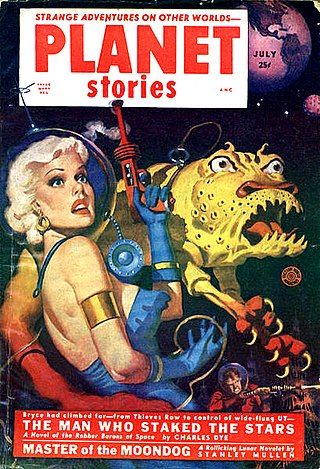
"Beyond Lies the Wub" is a science fiction short story by American writer Philip K. Dick. It was his first published genre story, originally appearing in Planet Stories in July 1952. It was first collected in The Preserving Machine in 1969, and was included in The Best of Philip K. Dick in 1977. It was the title story for the first volume of the original edition of Dick's collected stories. Translations of "Beyond Lies the Wub" have appeared in Dutch, French, German, Italian, Polish and Spanish; and the story has been included in more than a dozen anthologies.
"Exhibit Piece" is a 1954 science fiction short story by American writer Philip K. Dick. The story is an early exploration of the concept of shifting realities, a common theme in Dick's subsequent works. The protagonist is a future historian of the 20th century who finds himself shifting in time from the future to that time period. At first, it is unclear whether he is merely a man from the past imagining a future life, or vice versa.
"The Last of the Masters" is a science fiction novelette by American writer Philip K. Dick. The original manuscript of the story was received by the Scott Meredith Literary Agency on July 15, 1953, and the story was published by the Hanro Corporation in the final issue of Orbit Science Fiction in 1954. It has since been reprinted in several Philip K. Dick story collections, beginning with The Golden Man in 1980.

"Strange Eden" is a science fiction short story by American writer Philip K. Dick. It was first published in Imagination magazine during 1954, found under Second Variety and Other Classic Stories by Philip K. Dick in pp. 111–121.
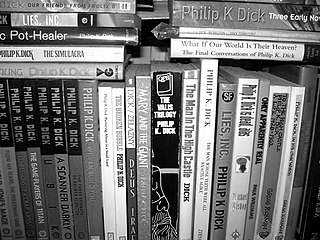
The bibliography of Philip K. Dick includes 44 novels, 121 short stories, and 14 short story collections published by American science fiction author Philip K. Dick during his lifetime.

"Planet for Transients" is a 1953 science fiction short story by American writer Philip K. Dick. The story was originally published in the October–November 1953 issue of Fantastic Universe. The story also appears in We Can Remember It for You Wholesale . The author's original title for the story was "The Itinerants".

The Collected Stories of Philip K. Dick is a collection of 118 science fiction stories by American writer Philip K. Dick. It was first published by Underwood-Miller in 1987 as a five volume set. See Philip K. Dick bibliography for information about the mass market reprints.
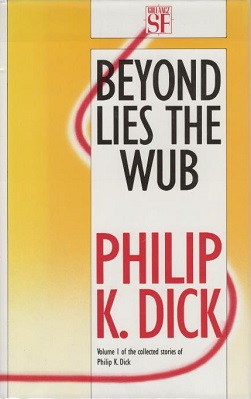
Beyond Lies the Wub is a collection of science fiction stories by American writer Philip K. Dick. It was first published by Gollancz in 1988 and reprints Volume I of The Collected Stories of Philip K. Dick. Many of the stories had originally appeared in the magazines Fantasy and Science Fiction, Planet Stories, If, Galaxy Science Fiction, Imagination, Space Science Fiction, Fantastic Story Magazine, Amazing Stories, Future, Cosmos, Fantasy Fiction, Beyond Fantasy Fiction, Thrilling Wonder Stories and Startling Stories. The collection was reprinted by Citadel Press in 2003 under the title Paycheck and Other Classic Stories.

The Short Happy Life of the Brown Oxford is a collection of science fiction stories by American writer Philip K. Dick. It was first published by Citadel Twilight in 1990 and reprints Volume I of The Collected Stories of Philip K. Dick. Many of the stories had originally appeared in the magazines Fantasy and Science Fiction, Planet Stories, If, Galaxy Science Fiction, Imagination, Space Science Fiction, Fantastic Story Magazine, Amazing Stories, Future, Cosmos, Fantasy Fiction, Beyond Fantasy Fiction, Thrilling Wonder Stories and Startling Stories. The collection was reprinted by Citadel Press in 2003 under the title Paycheck and Other Classic Stories.
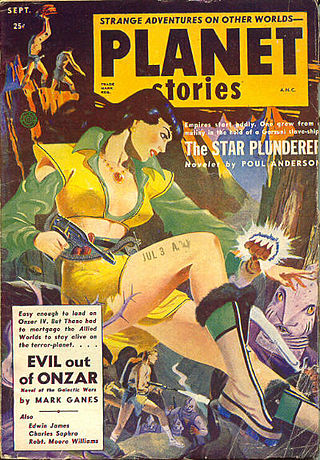
"The Gun" is a science fiction short story by American writer Philip K. Dick, first published in 1952 September issue of Planet Stories, and later published in Beyond Lies the Wub in 1984. "The Gun" has been published in Italian, German, French and Polish translations.

"The Skull" is a science fiction short story by American writer Philip K. Dick, first published in 1952 in If, and later in The Collected Stories of Philip K. Dick. It has since been republished several times, including in Beyond Lies the Wub in 1988.

"Mr. Spaceship" is a science fiction short story by American writer Philip K. Dick, first published in Imagination in January 1953, and later in The Collected Stories of Philip K. Dick. It has since been republished several times, including in Beyond Lies the Wub in 1988.
"The Infinites" is a science fiction short story by American writer Philip K. Dick, first published in 1953 in the May issue of Planet Stories. It has since been republished several times, including in Beyond Lies the Wub in 1988 and in The Collected Stories of Philip K. Dick.

"The Crystal Crypt" is a science fiction short story by American writer Philip K. Dick, first published in the January 1954 edition of Planet Stories and later published in Beyond Lies the Wub in 1988.
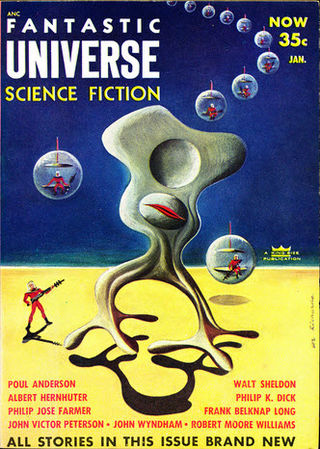
"Beyond the Door" is a low fantasy short story by American writer Philip K. Dick, first published in the January 1954 issue of Fantastic Universe. The plot follows a cuckoo clock, which may or may not be intelligent, and a cuckolded husband.
"The Hanging Stranger" is a science fiction short story by American writer Philip K. Dick, originally published in December 1953 in the magazine Science Fiction Adventures. It has been reprinted in several anthologies, and published in French, Italian and German. It was adapted by Dee Rees into the episode "Kill All Others" or "K.A.O." for the 2017 television series Philip K. Dick's Electric Dreams. A book was also released to republish "The Hanging Stranger" along with the nine other stories on which the Electric Dreams episodes were based.













